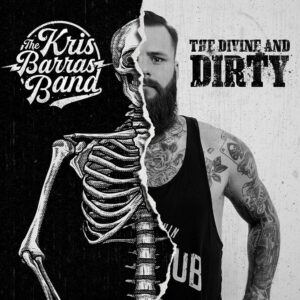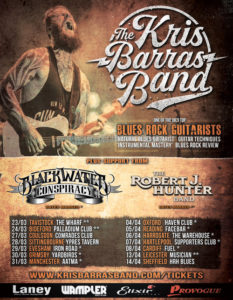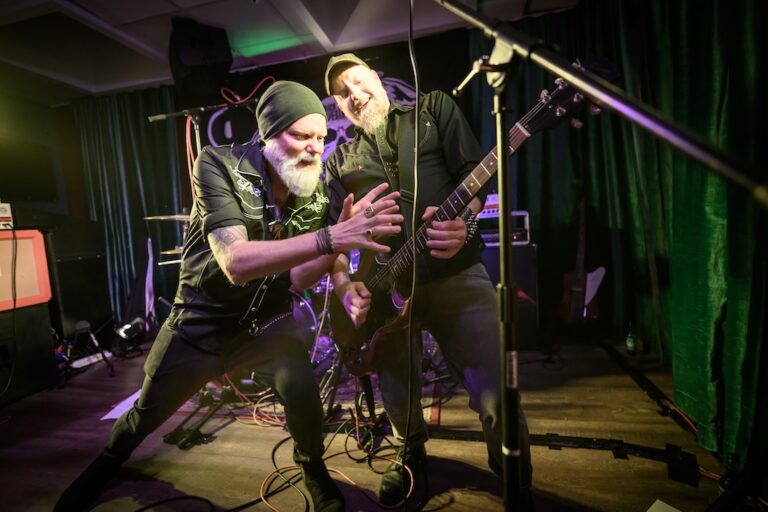On March 23rd, 2018, Kris Barras and his band release ‘the divine and dirty’, their second album and their debut for Mascot Records. Theirs is one of those fairy tale stories you hear about, whereupon the band went from self-funded, independent act to being signed to Mascot, one of the most respected labels in music today, through word of mouth and hard work alone. Despite his larger-than-life persona (not least because Kris spent a number of years as a professional, mixed martial arts fighter), Kris is quiet and down-to-earth, taking his time to answer each question thoughtfully and at his most excitable when discussing getting the band back out on stage. If you missed Kris’ first album, ‘Lucky 13’, then this is your chance to catch up with an exceptional talent:
I’ve been really enjoying the album a lot since I received it because it’s one of those records that has a lot of variety whilst remaining coherent – how did you approach the song-writing for the album and how long did it take to get all the pieces together?
Yeah, I didn’t really put much thought into styles or anything like that. I didn’t sit down and try to write a blues album or whatever. I just sat down and wrote some songs and what came out, came out. So, it’s a representation of a lot of my influences over the years, which is quite a lot of different music I suppose, also a lot of classic rock and Southern rock, whether it’s Skynyrd or whatever, so we ended up with quite an eclectic mix and, like I said, it’s just a representation of me and what I like to play. I didn’t want to set out to do a blues album and it had to sound a certain way. I just wanted to write the songs I wanted to write, it’s kind of an eighteen month period. I started writing songs and working on them and then chose the best ones for the album.
I’m always interested in the compositional process because I know it varies so much from person to person, but the album has this very sumptuous production and you’ve got some stunning backing vocals. How far do you take the demoes initially and what sort of work goes into the arrangements as you get closer to your allotted studio time?
This album… the demoes and pre-production were taken pretty fare, mainly just by myself. The band put their own spin on things in rehearsals leading up to the recording. With regards to backing vocals and things like that, I had these ideas in my head as I was writing songs and, as I was building the tracks up, I would always hear these things. Then, once we got into the studio, there were a few different things that the producer, Josiah Manning, came up with, and we just went form there really.
So, the final touches, the backing vocals and things were more of a studio collaboration?
Yeah. I’ve always loved that sound. I love that big sound and, eventually, we will take them out on the road as well. Once we can afford it! We’ll get them out on the road with us. Yeah, we didn’t want to go mad and put the vocals over everything. When I was writing the songs, I knew which ones would lend themselves to that kind of sound and roughly what I wanted and then the girls, who are fantastic…. There were three of them and they just came in one day and blasted it. They all sang at the same time. It wasn’t recorded individually; they were all in the room, so you got that proper, choir kind of sound.
In terms of the recording itself, it can be quite challenging to tread that line between something that’s organic and powerful and yet, at the same time, has that accessibility and that clean sound that seems to be expected when it comes to label recording. In terms of getting the recording down, was it a case of doing the initial tracks live and building over them, or were they all done separately? How was it approached?
So, most… I think all of the songs were recorded with the whole of the rhythm section live and together, then we added overdubs. Some of the tracks were even done without a click track, just to really have that live feel. Obviously things like the backing vocals were added after and guitar solos were added after, but the majority of it was added when we were in the room together.
How long did you spend tracking the album and then mixing after?
Well, the album was recorded in two halves… well, a third and two thirds. We recorded four tracks first of all, I did that probably around the middle of last year, around May last year. I recorded four tracks and that was when I wasn’t signed. It was self-financed and that was all I could afford in terms of studio time. We got four tracks done and then we wanted to use that to promote ourselves and to represent the latest version of what we were doing. Then we recorded the rest later on in the year. The total time in terms of studio days was two weeks. It’s not a massive amount of time for eleven tracks. So it was between twelve and fourteen days, I think. The mixing side of things was completely down to Josiah and, because whilst all this was going on, I did get signed and because we wanted to get the album out before the tour and the label wanted a good amount of promotion time, he was under it to get the album mixed and sent off to mastering in only a few weeks. He did a great job on that.
In terms of mastering, it’s one of the unsung elements of getting a record out there – trying to get a finished version where it maintains the integrity of the mix without getting overly compressed – did you have anyone in mind to master or did the label suggest someone?
Josiah had worked… just started working with a company who do a lot. They’re a big, big company called Star Delta. They’ve won Grammys for some of the albums they’ve mastered. They’re top guys and, as it happens, they’re in the West Country as well, so Josiah recommended them and we went with that. It was mastered twice – once for CD and digital and once for vinyl. We actually had it mastered separately for vinyl, as opposed to just whacking the digital version onto vinyl.
That’s really important – I’m guessing that if you went to that effort, you’re more of a physical format fan?
Well… not necessarily, no. But I do understand the importance. I don’t want to put some digital thing and slam it onto vinyl, it has to be done properly if you’re going to do it. I don’t even have a CD player at the moment, so I am actually all-digital. But, I understand the importance of getting it right for vinyl.
You worked in music education, is that right?
I used to teach at a music college, teaching a B-tech in music performance. I used to teach music theory, sight reading and things like that.
I’ve had this discussion with various guitarists, that there’s a thin line where you need the technical ability in order to be able to play what you want to play but where you also need to stand back from the technicality a touch to allow the emotion to come through – have you found that?
I think understanding theory and understanding what’s going on in music is extremely important. I think that having a bit of basic knowledge enables me to be able to be able to feel the music better anyway and to know what notes are the best and the most suitable to land on in any chord, just saves time. The amount of times you go to the pub and you’ll hear a guitarist who’s really, really good. You can just tell straight away that they don’t really understand what they’re playing over. They land on notes that just sound horrendous when, if they did it on another chord, it would sound great. For me, I was teaching in music college when I was nineteen years old. It was thirteen years ago and I’ve had nearly twenty professional mixed martial arts fights since then. I’ve lost a few brain cells. I don’t really put much thought into it, I just play what I want to play. I personally think I have a fair balance between the more technical stuff and the feel kind of stuff. I’m a big believer in the saying: “everything in moderation, including moderation”. If you’re slow and mid-paced all the time and you don’t put any of theta extra sparkle, it can be just as boring as something that goes ape-shit on the fret-board the whole time.
I seem to remember there was an interview with Roger Waters and he was talking about the nature of performers and I think he was trying to express the idea that a lot of performers have this innate need to be on stage and express themselves in a public forum and there’s a lot of connection between teaching where you have to assume on a role in front of a class, music performance and mixed martial arts fighting, where again you’re very much in the public eye – is that something you’ve thought about?
I just… I’ve always had a buzz from performing live. From playing, from fighting… that’s the only way I can explain it really. It’s probably an adrenalin thing. Before a big gig, some of the nerves that I feel beforehand are exactly the same nerves I used to feel before a fight. I get the same feeling and the same tingling all over my body. It’s just… it’s an adrenalin thing for me, I think. I never feel more at home than when I’m on stage and more so than when I was in a cage as well. Yeah, It’s the only way I can explain it really, it’s where I feel the most comfortable and where I get the most enjoyment.
It’s quite unusual for an artist to get signed half way through the recording of an album. You said you did the first third as a promotional tool, so I guess you were looking to take it to the next level… but how did it come about?
There was no clear, set thing that happened. We were playing a lot, getting the name out there, and we did some big festivals that helped get us noticed. I did have a chance meeting with Steve, the UK label boss for Mascot at Rambling Man fair in the VIP tent. We had a little chat for fifteen minutes over a beer, but it wasn’t really anything about me and signing me or anything like that, it was just a general chit chat. He asked a few questions about what we were up to, he said that he’d heard a fair bit about us form a few different people and blah blah blah. Later on in the year, I got a message through the contact page of my website from Ed, the owner of Mascot. The message literally read “Hi Kris, I’ve checked out some of your stuff on line, it sounds great… are you singed? Thanks, Ed”.
I thought it was a wind up, so I passed it on to my manager and I said I thought it was someone taking the piss, but could he give them a ring to see what they said. Then my manager rang back and explained that it wasn’t a line up and within a few days, we had an offer on the table and about a week after that it was all signed and done. So, a bit of a weird one really. As a musician, certainly a regional musician, there’s always that thing of “how do you get signed?” and now I look back and I think, I have no idea how I got fucking signed! It just happened!
That’s kind of the dream – to get contacted in that way. Once you were signed, did the label want to have an A&R input or were they happy to just let you carry on with what you’d started?
They just let me crack on. They loved what we’d done so far and when we sent over the final mixes, they loved it too. I’m sure if there’d been any problems they would have suggested that we redid some stuff or changed some tracks or whatever, but they were happy with what we’d done. I’m sure on the album, there’ll be a bit more involvement and a bit of back and forth. I’m sure, but we haven’t reached that stage in discussions yet because we’re still promoting this one… in fact it’s not even out yet! But they were happy just to let us do what we wanted.
My final question is that you’re out on the road very soon – what can we expect from this tour. Is it going to be emphasising the new album?
I think it’s going to be pretty much well-divided between the new album, ‘lucky 13’. There’s some good songs on that album that always go down really well live, so we’re not looking to drop them from the set anytime soon. It’s a good mix of old and new plus a couple of new bits, a couple of new arrangements. We’ve really worked hard to polish up the set and create a top-quality show. We’re looking forward to getting out and doing it.
The Kris Barras Band 2018 UK tour dates
Mar 23: Tavistock The Wharf
Mar 24: BidefordThe Palladium
Mar 27: Caterham The Comrades Club
Mar 28: Sittingbourne Ypres Tavern
Mar 29: Evesham The Iron Road
Mar 30: Grimsby Yardbirds Club
Mar 31: Manchester Aatma
Apr 04: Oxford The Bullingdon
Apr 05: Reading The Face Bar
Apr 06: Harrogate The Warehouse
Apr 07: West Hartlepool The Supporter’s Club
Apr 08: Cardiff Fuel
Apr 13: Leicester The Musician
Apr 14: Sheffield HRH Blues O2 Academy
May 18: Abertillery Blues Rock Festival
Jun 15: Ferndown LoveRocks Festival
Jul 01: Maistone Ramblin’ Man Fair






